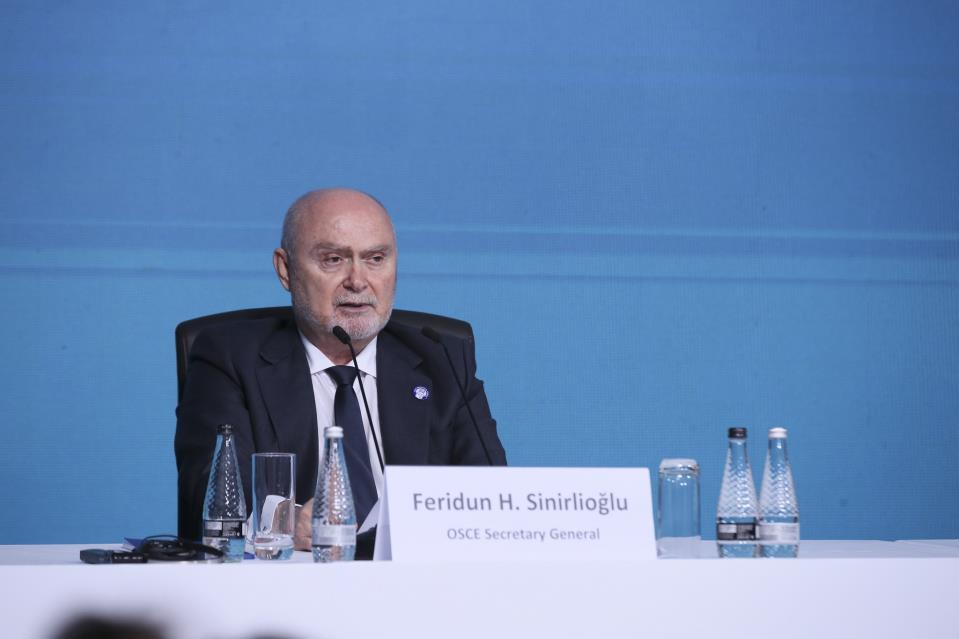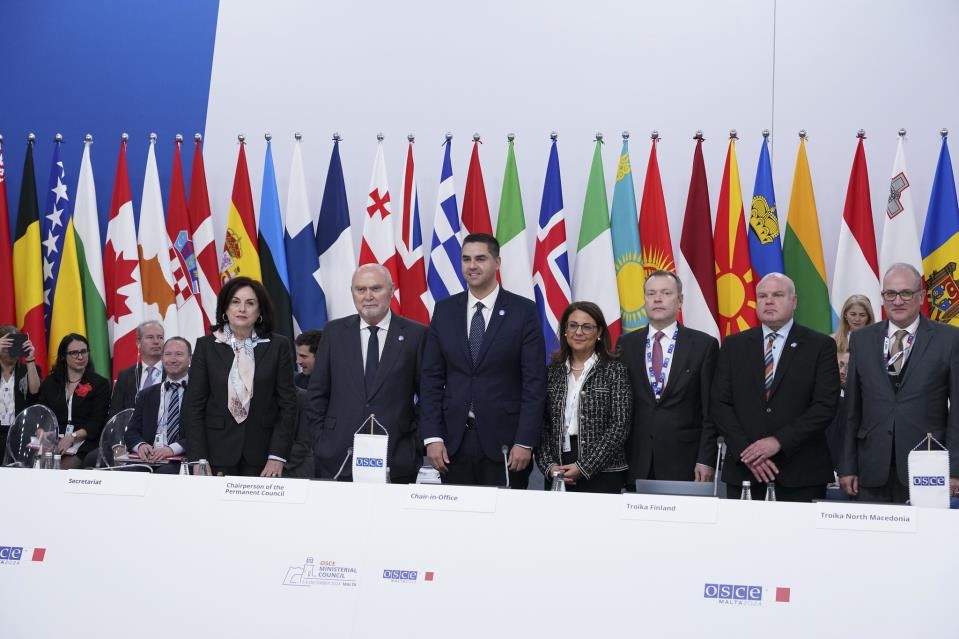A new leadership team for the Organisation for Security and Cooperation in Europe (OSCE) has been chosen after a unanimous agreement between the 57 member states in the Ministerial Council meeting being held in Malta.
The announcement was made by Deputy Prime Minister and Foreign Affairs Minister Ian Borg, who was chairing the Council, in a press conference on Friday afternoon at the Mediterranean Fairs & Conventions Centre in Ta’ Qali.
Borg, flanked by the newly appointed Secretary General of the OSCE Feridun Sinirlioğlu, said that “Malta’s legacy is not a perfect OSCE, but a more resilient one” as he emphasised that the organisation now has the capacity to continue its work.
Feridun Sinirlioğlu is a former Foreign Affairs Minister for Turkey, and also the country’s Permanent Representative to the United Nations between 2016 and 2023. He will take on the top post in the OSCE, succeeding Helga Maria Schmid, whose term had to be extended by a year to last September as no consensus could be reached on her successor.
Maria Telalian, from Greece, has been appointed as the Director of the OSCE Office for Democratic Institutions and Human Rights, Cristophe Kamp, from the Netherlands, has been appointed as the OSCE High Commissioner on National Minorities, and Jan Braathu from Norway as the OSCE Representative on Freedom of the Media.
Their appointments had to be unanimously approved by all 57 member states – which includes Russia, who were represented on Thursday by Foreign Minister Sergey Lavrov in what was his first time on European Union soil since his country invaded Ukraine in February 2022.
Addressing the press, said that the outcome was no easy feat. “It required months of negotiation and tireless diplomacy, and a shared belief in preserving the OSCE’s functionality,” Borg said.
No agreement, in fact, was reached on the OSCE’s budget and neither was there any consensus on who will chair the organisation in 2026 and 2027.
Sources told The Malta Independent that Switzerland appeared the likeliest candidate to chair the organisation in 2026 – but this was not agreed. Borg himself said that Cyprus had offered to chair the organisation in 2027.

Still, Borg highlighted that Malta had taken on the chairpersonship of the OSCE last year at the last minute – this after Russia had disagreed with Estonia holding the position – and with the organisation at an impasse and “faced with fundamental geopolitical divisions and institutional paralysis.”
“Over the past year, we have worked tirelessly to keep the OSCE functioning during one of the most challenging periods in its history,” Borg said.
He gave particular attention to Russia’s war against Ukraine – which was also something he decisively highlighted in his speech opening the meeting on Thursday, with Lavrov present.
“Russia's war against Ukraine has not only devastated millions of lives, it has also contested the foundations of Europe's security architecture. That is why we made a deliberate decision to put Ukraine at the centre of our work. Our duty was - and still is - to do all we can to help Ukraine alleviate the appalling effects of the war,” Borg said.
The Foreign Affairs Minister highlighted some thematic aspects that the Malta chairpersonship had worked on – ranging from the digital age to the connection between climate resilience and security to the promotion of democracy and fundamental freedoms.
“Achieving consensus among all 57 participating States is no small task, especially in times of deep divisions. And in the OSCE, even the smallest decisions are tied to politics. It is not ideal, but it is the reality we work with,” Borg said.
“As I have often said, diplomacy is not about convenience, it is about necessity. It is pleasant to reach quick agreements with our friends and allies, but it is often far more important to engage with those who disagree with us. This is the very essence of the OSCE,” he added.
“Malta’s legacy is not a perfect OSCE, but a more resilient one. In a year of significant challenges, we have shown that even when the odds are stacked against us, multilateralism can prevail,” he concluded.
In his first speech as Secretary General of the OSCE, Feridun Sinirlioğlu said that his immediate priorities will be to immerse himself into the organisation and to ensure that the OSCE remains agile and ready to respond to the evolving security landscape.
Answering questions from the media, Borg said that there is still the possibility for an agreement to be reached on the budget for the OSCE before the end of the year.
Asked whether he agreed with calls from Poland for Russia to be suspended from the OSCE – particularly as Lavrov’s only contribution in Malta was to launch an anti-West tirade against many of those present, before he left the country later in the afternoon – Borg said that there are many organisations of like-minded countries where Russia is not a member.
“I would rather have the other 56 – although it looks like we are still 55 – sitting with Russia on the same table and telling them to stop this war and withdraw from Ukraine’s sovereign territory. It’s easy to discuss amongst friends and alliance, but ultimately sometimes, especially against the backdrop of raging war, we have to engage with those who started and can stop this war immediately,” Borg said.
Asked about the legacy for Malta that this council will bring, Borg said that first and foremost this was a history time, because at no point in history was there a country chairing the OSCE while also holding a seat on the United Nations Security Council, like Malta has been over the past year.
He said that Malta’s neutrality in this set of circumstances allowed it to be trusted by all 56 countries, and said that Malta could have easily shied away from taking on this responsibility – but it felt it should contribute.
He conceded that some had told him that the OSCE may die in Malta’s hands if no agreements were reached, but said that instead it emerged with new tools in the form of a new leadership team. “The legacy Malta is leaving is clear.”

Addressing the plenary’s closing session soon after, Borg praised the “important achievement” that was the consensus on the new administrative team, saying that it was a bumpy road to read with months of inclusive dialogue, painstaking negotiations, and ultimately some compromises as well.
“I deeply regret that despite extensive good faith effort, consensus could not be reached on the budget,” he said.
“Collective decisions should not be at the mercy of individual political considerations or bilateral issues,” he said, but added that it had been demonstrated in these two days that consensus is “not an obsolete relic of the past.”
“The decision we have taken today is more than an administrative milestone, yet we must be honest with ourselves – without a budget the OSCE’s power to act is significantly weakened,” he said, adding that the OSCE’s ability to tackle issues and serve those who rely on it hangs in the balance.
He said that Russia’s invasion of Ukraine continues to inflict suffering. “It will end, but how and when? How many more innocent lives will be cut short or traumatised forever? And once peace prevails will we learn from our mistakes?”
He said that these past two days were the “first brick of stability” and the organisation had been left – if partially – with more resilience that Malta had found it in.
“Resilience should not mean firefighting: as we look to the future we must not settle for mere survival, we must look beyond resilience,” he said, speaking about the concept of ‘anti-fragility’, which is the concept of growing stronger when harmed and not just resisting shocks and enduring adversity.
His final emphasis however was on needing, above all else, peace.
“We remain firm believers in the OSCE’s role as an essential contributor to the peace, security, and prosperity of the people it serves,” Borg concluded.
The chairpersonship of the OSCE will be taken over by Finland at the start of the new year – marking a full circle since it was set up in Helsinki 50 years ago.
Photos: OSCE